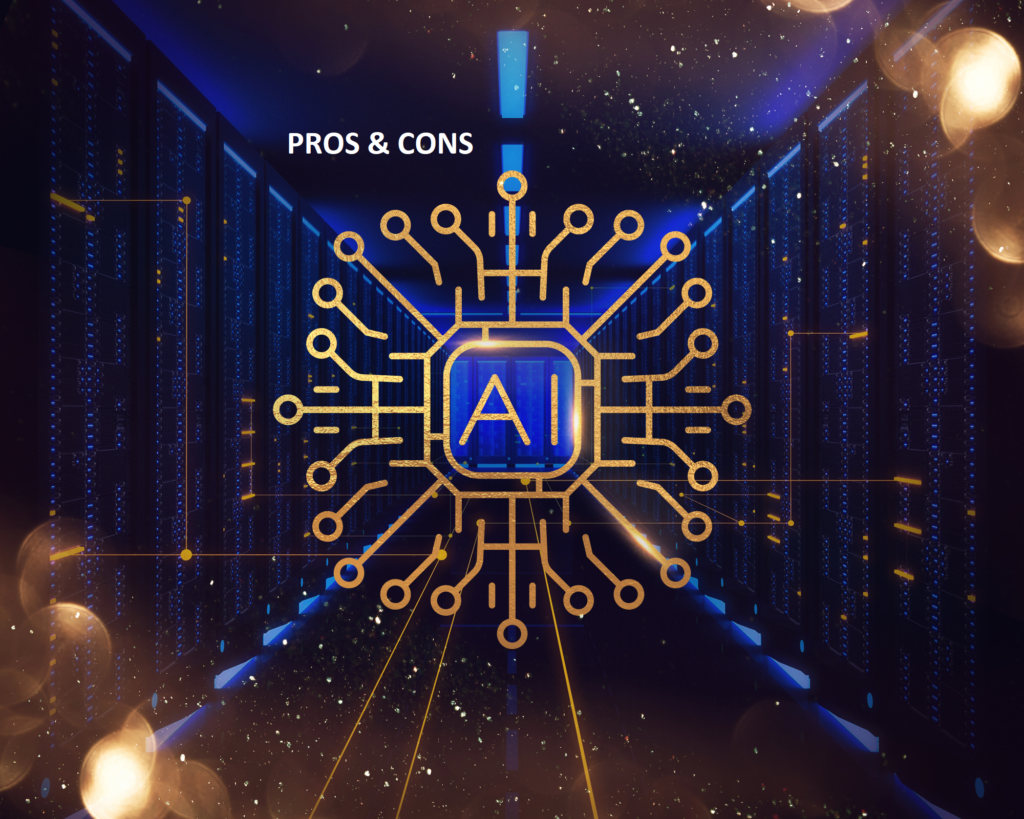Navigating the Landscape of Artificial Intelligence: Exploring Its Pros and Cons
In the ever-evolving realm of technology, Artificial Intelligence (AI) stands out as one of the most transformative innovations of the 21st century. From enhancing efficiency in industries to revolutionizing everyday life, AI has become an integral part of our modern world. However, like any powerful tool, AI comes with its own set of advantages and disadvantages, shaping our society in profound ways. In this comprehensive exploration, we delve into the myriad of pros and cons surrounding AI, shedding light on its impact on various facets of human existence.

Pros of Artificial Intelligence
1. Efficiency and Automation
One of the most significant advantages of AI is its ability to streamline processes and automate tasks. AI-powered systems can perform repetitive tasks with unparalleled speed and accuracy, freeing up human resources for more creative and strategic endeavors. From manufacturing to customer service, AI automation has revolutionized industries, leading to increased productivity and cost savings.
2. Decision Making and Predictive Analytics
AI excels at analyzing vast amounts of data to extract meaningful insights and make informed decisions. Through advanced algorithms and machine learning models, AI can predict trends, identify patterns, and optimize strategies in various domains such as finance, healthcare, and marketing. This predictive capability enables businesses and organizations to stay ahead of the curve and adapt to changing circumstances effectively.
3. Personalization and Customer Experience
AI-powered systems have transformed the way businesses interact with customers by enabling personalized experiences tailored to individual preferences. From recommendation engines to virtual assistants, AI algorithms leverage user data to deliver relevant content, products, and services, enhancing customer satisfaction and loyalty. Personalization not only fosters stronger customer relationships but also drives business growth through increased engagement and conversions.
4. Healthcare Advancements
In the field of healthcare, AI holds immense promise for improving diagnosis, treatment, and patient care. Machine learning algorithms can analyze medical images, detect anomalies, and assist healthcare professionals in diagnosing diseases with greater accuracy. Additionally, AI-powered predictive models can help identify individuals at risk of certain health conditions, enabling early intervention and preventive measures. Overall, AI technologies have the potential to revolutionize healthcare delivery, leading to better outcomes and reduced healthcare costs.
5. Innovation and Creativity
AI serves as a catalyst for innovation by augmenting human capabilities and unlocking new possibilities. Through techniques like generative adversarial networks (GANs) and natural language processing (NLP), AI systems can create art, music, literature, and even scientific discoveries. By collaborating with AI, humans can explore uncharted territories, break creative barriers, and push the boundaries of what is possible, leading to groundbreaking innovations in various fields.
Cons of Artificial Intelligence
1. Job Displacement and Economic Disruption
While AI automation promises increased efficiency, it also raises concerns about job displacement and economic disruption. As AI systems take over repetitive tasks and roles traditionally performed by humans, there is a risk of unemployment and underemployment, particularly for low-skilled workers. Moreover, the rapid pace of technological advancement may outpace the ability of workers to adapt, leading to widening income inequality and social unrest.
2. Bias and Fairness Issues
AI algorithms are only as unbiased as the data they are trained on, and without careful oversight, they can perpetuate or even exacerbate existing biases in society. From hiring algorithms that discriminate against certain demographics to predictive models that disproportionately target marginalized communities, AI systems can amplify systemic inequalities and perpetuate social injustice. Addressing bias and ensuring fairness in AI decision-making remains a significant challenge that requires ongoing attention and ethical considerations.
3. Privacy and Surveillance Concerns
The proliferation of AI technologies has raised concerns about privacy infringement and mass surveillance. AI-powered surveillance systems equipped with facial recognition, biometric identification, and predictive analytics have the potential to erode personal privacy and civil liberties. Moreover, the collection and analysis of vast amounts of personal data by AI algorithms raise questions about consent, data ownership, and the potential for misuse by governments and corporations. Balancing the benefits of AI-enabled surveillance with the protection of individual rights presents a complex ethical dilemma for society.
4. Dependence and Vulnerability
As society becomes increasingly reliant on AI technologies for critical functions and decision-making, there is a growing concern about dependence and vulnerability. AI systems are susceptible to errors, malfunctions, and cyber attacks, which can have far-reaching consequences ranging from financial losses to public safety risks. Moreover, the opaque nature of some AI algorithms makes it difficult to understand their inner workings and anticipate potential failures, exacerbating uncertainty and distrust in AI systems.
5. Ethical and Moral Implications
The ethical and moral implications of AI raise profound questions about the relationship between humans and machines, autonomy, and accountability. As AI systems become more sophisticated and autonomous, they may face complex moral dilemmas and decision-making scenarios that challenge traditional ethical frameworks. From autonomous vehicles making life-or-death decisions to AI-powered weapons in warfare, navigating the ethical terrain of AI requires careful consideration of values, principles, and societal norms.
Conclusion
Artificial Intelligence represents a double-edged sword, offering immense potential for progress and innovation while posing significant challenges and risks to society. As we harness the power of AI to address complex problems and enhance human capabilities, it is imperative to strike a balance between reaping its benefits and mitigating its drawbacks. By fostering transparency, accountability, and ethical oversight, we can steer AI towards a future that maximizes its potential to serve humanity while safeguarding against its potential pitfalls. In navigating the landscape of AI, thoughtful deliberation and responsible stewardship are essential to ensure a future where technology works for the betterment of all.